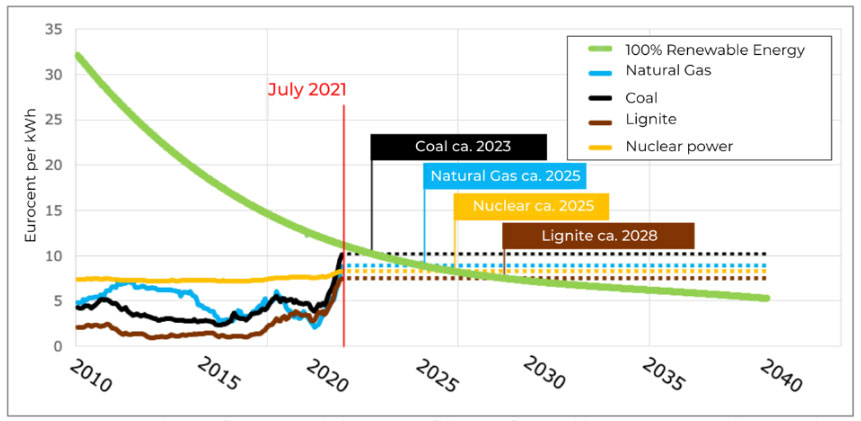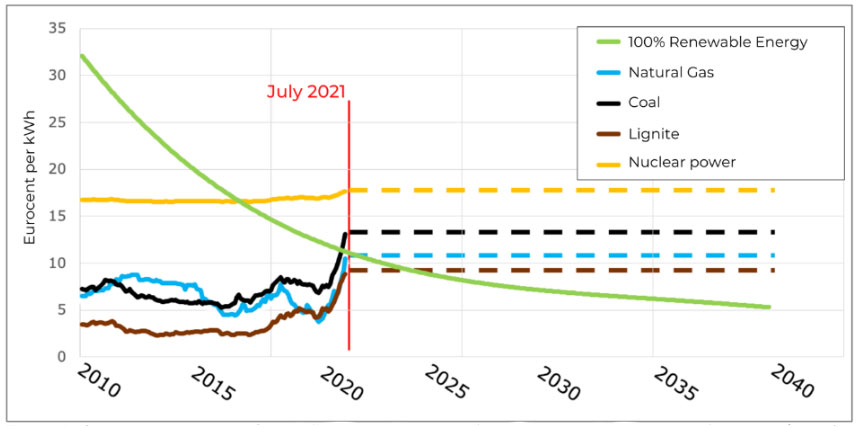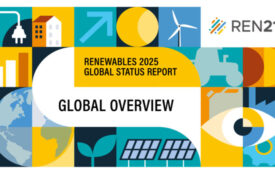New Study: Electricity would already be Cheaper today with a Full Supply of 100% Renewables
New short study by the Energy Watch Group (EWG) finds: Electricity would already be cheaper today with a full supply of 100% renewables.
In the coalition negotiations for the new German government, both ambitious climate protection and the reduction of electricity prices play a central role. The previous government still expects only 45% renewables in the electricity mix by 2025. A new short study by the Energy Watch Group offers an answer to the rising energy costs: The study calculates that a full supply with 100% renewables would already be economically competitive today compared to the current energy system based on coal, natural gas and nuclear. By 2025 at the latest, an energy system based on 100% renewables would then be significantly cheaper than power generation with fossil fuels.

fallen below the costs of unsustainable energy options from an uncompetitively high level in 2010, and that holds
true even when the environment is not fully accounted for in the cost calculation.
“Since around 2017, the electricity generation costs for solar and wind power have fallen far below the electricity generation costs of conventional power plants such as natural gas, coal or nuclear. However, this new development is largely dismissed in societal discourse with the claim that total system costs, including storage, would be far higher than those of conventional power generation. The study proves that this claim is outdated and simply wrong.”, adds Hans-Josef Fell, President of EWG.
The latest developments in the price decline of renewables and storage technologies in conjunction with the price increases of conventional power generation leave no room for doubt: Since 2021, supply-secure power generation from 100% renewables is cheaper than power from newly built conventional power plants, even including storage costs. From 2025, even conventional power plants that have already been built and depreciated will no longer be able to compete economically with newly built full-supply systems with 100% renewable energy. These findings are obtained by modeling the development of electricity prices based on current data.

production costs of conventional power generation technologies. Optimization of the renewable energy system
based on data from EWG Scenario 2 presented in the Germany study (Traber, Hegner & Fell, 2021) and learning
curves based on Ram, et al. (2019). The data for the development of natural gas and coal prices are based on data
from the Federal Reserve Bank of St Louis (2021) and index mundi (2021) and were adjusted to continental Europe.
Prices for emission rights in European emissions trading can be found at icap carbon action (2021). Here, nuclear
energy is set at a premium of 3.5 euro cents per kWh to hedge nuclear risks (Günther, Karau, Kastner, & Warmuth,
2011). The presented constant costs for conventional energy supply after 2021 do not represent an energy
forecast, but are only intended to visualize its foreseeable inefficiency.
“In the next few years, conventional existing plants will no longer be economically viable to operate due to the lower costs of renewable full supply. This means that a historically favorable extensive self-sufficiency in all energy sources will be within reach in Germany and also worldwide. This revolution in the fundamental conditions of energy supply can be seen as an opportunity and must be used for immediate climate protection. This means that all energy investments must be immediately withdrawn from fossil fuels and directed into renewable energies,” says Dr. Thure Traber, lead author of the study.
Download the Short Study here in English and German.








